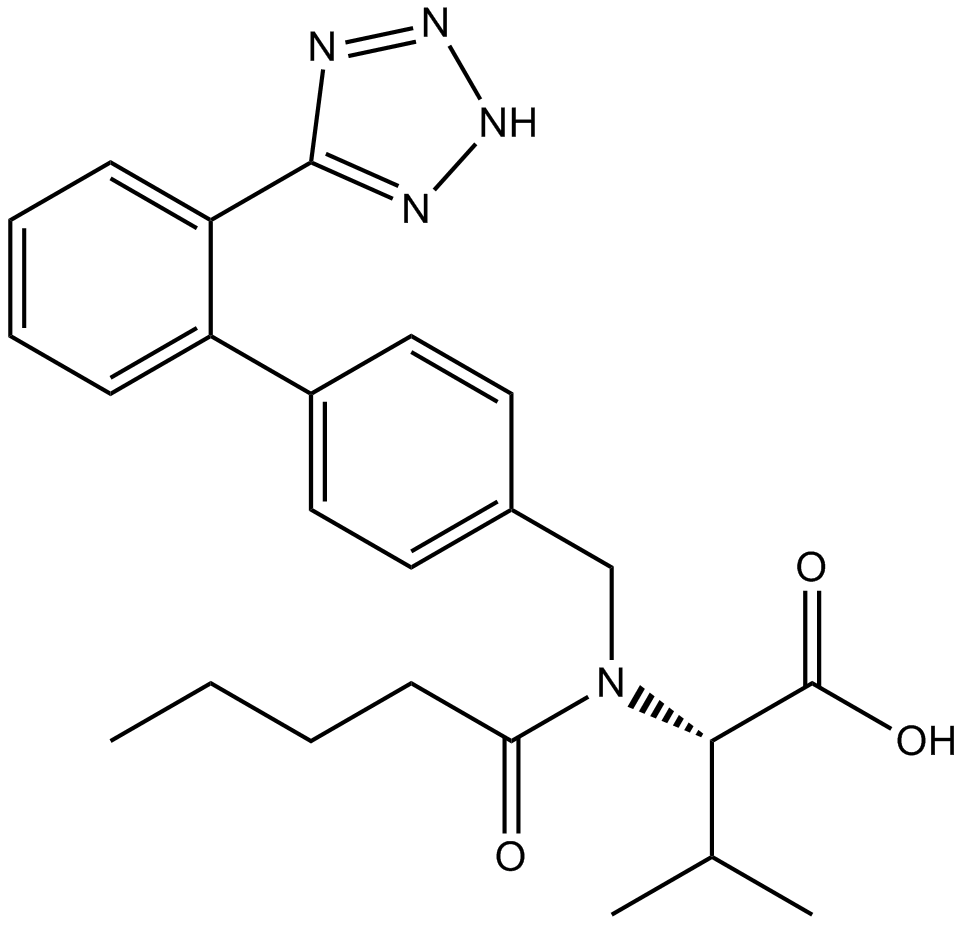Valsartan (Synonyms: CGP 48933) |
| Catalog No.GC10765 |
Angiotensin II AT1 receptor antagonist
Products are for research use only. Not for human use. We do not sell to patients.

Cas No.: 137862-53-4
Sample solution is provided at 25 µL, 10mM.
Valsartan (CGP-48933) is an angiotensin II receptor antagonist for treatment of high blood pressure and heart failure.
Valsartan is a synthetic non-peptide angiotensin II type 1 receptor antagonist that dilates blood vessels and reduces blood pressure by blocking the action of angiotensin. Valsartan significantly decreases the expression of AT1R in ageing aorta endothelial cells[1]. The pretreatment of valsartan results in an inhibition of TLR2 signaling and proinflammatory cytokines. The expression of AGTR1 is up-regulated after alcohol exposure, and is blocked by valsartan pretreatment[2].
Valsartan significantly attenuates the expression of TGF-β/Smad, Hif-1α and fibrosis-related protein in rats after MI. Heart function, infarcted size, wall thickness as well as myocardial vascularization of ischaemic hearts are also significantly improved by valsartan compared with saline and hydralazine[3]. Valsartan partially reverses the effects of high-salt diet on hypertension, cardiac injuries such as fibrosis and inflammatory cell infiltration, and inhibition of aquaporin 1 and angiogenic factors; valsartan alone does not exert such effects[4]. Valsartan is an effective antidepressant/antianxiety reagent and can promote the hippocampal neurogenesis and expression of BDNF. Chronic administration of valsartan (5-40 mg/kg/d, p.o.) increases the time spent in the center of the field in OFT and the latency to eat in NSF, reduces the immobility time in both TST and FST, and increases the sucrose preference in SPT[5].
Reference:
[1]. Shan H, et al. Valsartan ameliorates ageing-induced aorta degeneration via angiotensin II type 1 receptor-mediated ERK activity. J Cell Mol Med. 2014 Jun;18(6):1071-80.
[2]. Wang Y, et al. Valsartan blocked alcohol-induced, Toll-like receptor 2 signaling-mediated inflammation in human vascular endothelial cells. Alcohol Clin Exp Res. 2014 Oct;38(10):2529-40.
[3]. Sui X, et al. Novel mechanism of cardiac protection by valsartan: synergetic roles of TGF-β1 and HIF-1α in Ang II-mediated fibrosis after myocardial infarction. J Cell Mol Med. 2015 Aug;19(8):1773-82.
[4]. Jiang Y, et al. Cardioprotective effect of valsartan in mice with short-term high-salt diet by regulating cardiac aquaporin 1 and angiogenic factor expression. Cardiovasc Pathol. 2015 Jul-Aug;24(4):224-9.
[5]. Ping G, et al. Valsartan reverses depressive/anxiety-like behavior and induces hippocampal neurogenesis and expression of BDNF protein in unpredictable chronic mild stress mice. Pharmacol Biochem Behav. 2014 Sep;124:5-12.
Average Rating: 5 (Based on Reviews and 39 reference(s) in Google Scholar.)
GLPBIO products are for RESEARCH USE ONLY. Please make sure your review or question is research based.
Required fields are marked with *




















